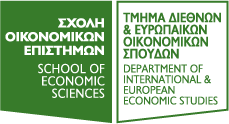Delphi 2005
ATHENS UNIVERSITY OF ECONOMICS AND BUSINESS
DEPARTMENT OF INTERNATIONAL AND EUROPEAN ECONOMIC STUDIES
International Conference on
Assessing Multilateralism in the Security Domain
European Cultural Centre of Delphi
3-5 June 2005
About the Conference
The Department of International and European Economic Studies (DIEES) of the Athens University of Economics and Business (AUEB) organizes a conference on "Assessing Multilateralism in the Security Domain".
The conference's participants are distinguished scholars from the United States and Europe who will gather in Delphi to present their research findings on a rather timely question in international relations theory, namely how security institutions matter and under what conditions.
The range of topics is rather broad and they will be approached from a rational/neoliberal institutionalist perspective as well as from a sociological or constructivist perspective. There will be presentations on US policy in the post 9/11 era (unilateralism vs multilateralism, American liberal hegemonic order, empirical (both qualitative and quantitative) assessments on whether international security institutions are both the objects of state choice and/or consequential (case-studies regard certain functions of the United Nations, NATO and the European Union) and multilateralism in the periphery (with regard to certain sub-systems and/or bilateral conflicts).
Organizing Committee
Dimitris Bourantonis (Chairman), Athens University of Economics and Business
Costas Ifantis, University of Athens
George Pagoulatos, Athens University of Economics and Business
Panos Tsakaloyiannis, Athens University of Economics and Business
Panayiotis Tsakonas, University of Aegean
Conference ProgramEuropean Cultural Center of Delphi, 3-5 June 2005 |
|
Thursday, 2 June 2005 |
|
|
20.30- 22.00 |
Dinner |
Friday, 3 June 2005 |
|
|
09.20-09.30 |
Welcome address – Thomas Moutos (AUEB) |
Session I
09.30-11.00 |
The Effects of International Security Institutions: A Critical Analysis John Duffield (Georgia State University) |
|
Unipolar Empire and Principled Multilateralism as Strategies for International Change: Democracy Promotion and International Justice Jack Snyder (Columbia University) |
|
|
Chair: Kostas Ifantis (University of Athens) |
|
|
11.00-11.30 |
Coffee Break |
Session II
11.30-13.00 |
U.S. Military Commitments: Multilateralism and Treaties Lisa Martin (Harvard University) |
|
Effective Multilateralism vs. Coalitions of the Willing - The Crisis of theTransatlantic Security Community Thomas Risse (Free University of Berlin) |
|
|
Chair: Michael Ruehle (NATO) |
|
|
13.00-14.30 |
Lunch Break |
Session III
14.30-16.00 |
Is Multilateralism bad for Humanitarianism? Michael Barnett (University of Minnesota)
|
|
Why no UN Security Council Reform? Lessons for and from Institutionalist Theory Erik Voeten (George Washington University)
|
|
|
Chair: Panos Tsakaloyannis (AUEB) |
|
|
16.30-18.45 |
Guided tour of the Archaeological Site and Museum |
|
21.00-23.00 |
Conference Dinner, Hotel Xenia, Delphi |
Saturday, 4 June 2005 |
|
Session IV
9.30-11.00
|
Institutions and Social Mechanisms: What – If Anything – Makes Europe and the EU Different? Jeffrey Checkel (University of Oslo) |
|
Multilateralism in Post-Cold War NATO: Functional Form, Identity-Driven Cooperation Frank Schimmelfennig (University of Mannheim) |
|
|
Chair: Stephanie Babst (NATO) |
|
|
11.00-11.30 |
Coffee Break |
Session V
11.30-13.30
|
State Attributes and System Properties: Security multilateralism in Europe, the Atlantic Pacific, and Eurasia James Sperling (University of Akron)
|
|
From ‘Perverse’ to ‘Effective Institutionalism’? NATO, EU and the Greek-Turkish Conflict P. Tsakonas and D. Bourantonis (University of Aegean and AUEB) |
|
|
Risk Aversion and the Design of Security Institutions Barbara Koremenos (University of California) |
|
|
Chair: George Pagoulatos (AUEB) |
|
|
13.30-15.00 |
Lunch |
|
19.30 |
Departure for the seaside town of Galaxidi |
|
21.00-23.00 |
Dinner, Taverna Tassos, Galaxidi |
Table Paper:Alternative Measures and Estimates of Peacebuilding Success Michael Doyle (Columbia University) and Nicolas Sambanis (Yale University) |





